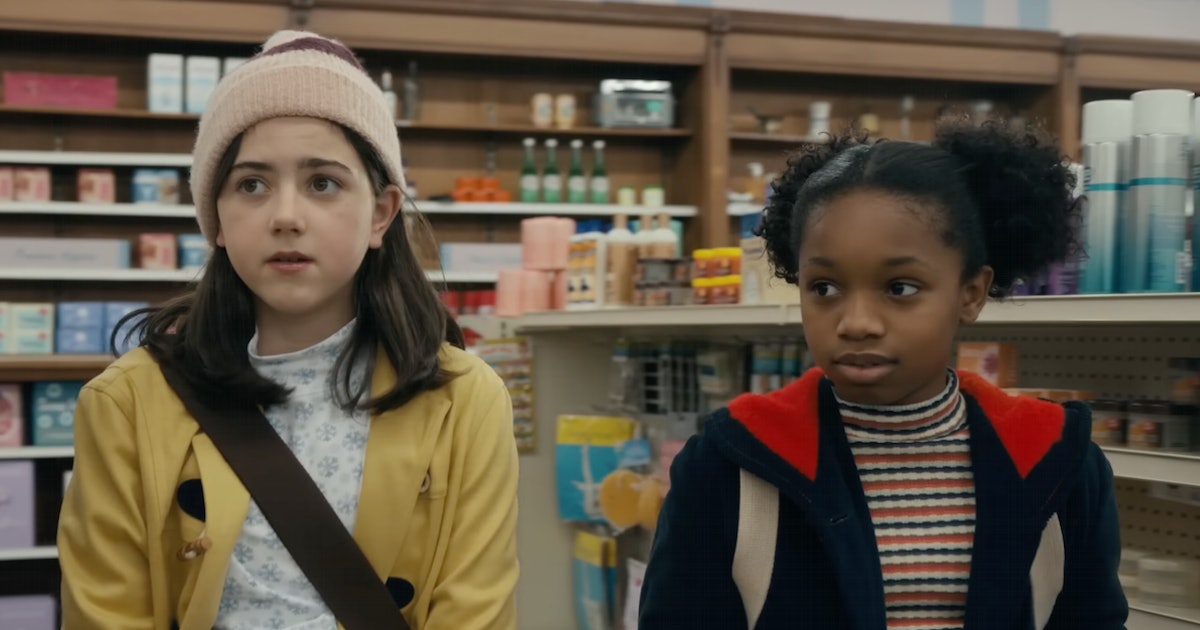Written by Margaret Rasberry on April 27, 2023
In a landscape of unprecedented book bannings from conservative politicians and activists, it seems almost too fortuitous that one of the most challenged books of all time Are you There God? It’s Me, Margaret (1970) by Judy Blume, renowned for its frank depiction of burgeoning teenage female sexuality and religious ennui would finally be adapted to the big screen, and at the end of the American Library Association’s National Library Week, and it was well worth the wait. Kelly Fremon Craig’s sophomore feature is an effusively charming and sincere adaptation of Blume’s classic that is destined to be recognized as one of the best adaptations of the 2020s.
Margaret Simon (Abby Ryder Fortson) has just felt like her whole life has been upended in 1970. Her father Herb (Benny Safdie) has been promoted which means moving from Manhattan to a suburb in New Jersey, while her free spirited second wave feminist mother Barbara (Rachel McAdams) also struggles with the transition, having quit her art teaching vocation to become a stay at home mother, like many of the neighborhood mothers who capitulate to patriarchal order of 1950s white suburbia. Margaret is immediately inducted into the secret local neighborhood girl group headed by the snobbish and gossipy pre-teen Nancy Wheeler (Elle Graham) who forces the group to reveal secrets to each other such as which boys they have crushes on, if they are wearing a bra (“We must, We must, We must increase our Bust!” becomes a mantra in order to develop chest area in hilarious vignettes), and when they start their menstrual cycle, leading to Margaret to feel pressure to develop sooner rather than later to fit in.
Margaret narrates her thoughts akin to diary entries to God by praying in multiple intervals of the film. The film establishes that Margaret feels disconnected from organized religion as a result of her upbringing. Her father is Jewish and her grandmother Margaret feels a deep rapport with Slyvia (Kathy Bates) wants her to grow up in the Jewish faith, while Barbara grew up Christian and was disowned by her devout parents for marrying outside their religious circles. Margaret’s various attempts to imbue her sense of faith lead to feelings of ennui as one prayer to god succinctly puts it “ Why do I only feel you (God) when I’m alone?” that is certain to resonate with many, as it did with me during my screening.
The emotional core of the film truly belongs to both Margaret and Barbara as Fortson and McAdams craft a cathartic bond as mother and daughter, with singular touching moments such as Barbara stroking Margaret’s hair and kissing her temple in the solemn moments that remind the audience of why we watch these films. Barbara also provides the secondary core element of the film in a role McAdam’s plays with such poignancy as a woman struggling to adapt to suburbia with her second wave feminist leanings placing her at odds with the other mothers, with highlighted hair reminiscent of Gloria Steinhem’s own famous waves providing a stark contrast with the coiffed hair of PTA president and Nancy’s mother Jan (Kate MacCluggage). Barbara’s plotline is expanded from the original book to convey that women are always coming of age or struggling to adapt to their environments and McAdam’s is terrific at finding that balance between sincerity and melodrama in this role.
It is heartening to see The Simpsons like James L. Brooks and Richard Sakai using their vast net worth to provide these opportunities to female directors to adapt these necessary and seminal texts for people without a fear of a loss of profit margins because Are you There God? It’s Me, Margaret is a story that demands to be told, read, and now watched with the whole family. In a world where our cinemas are replete with remakes, reboots, the fatiguing Superhero fare and more, adaptations of famously challenged texts deserve recognition as these are the films that wholly encapsulate the human condition and that resonates with the viewer. And is that not what we all want in our art?
Grade: B+
